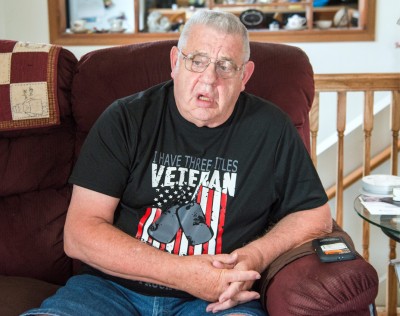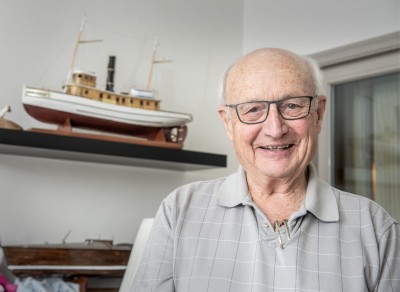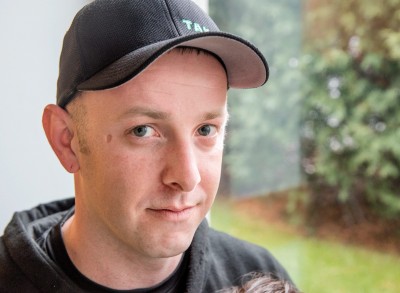Matt Kreeb
By Paul Wood

Photo By Rick Danzl/The News-Gazette
GILMAN — Sgt. Matt Kreeb was eager to serve his country.
The Iroquois West grad served in the prestigious and demanding duty of guard at the Tomb of the Unknowns at Arlington National Cemetery near Washington, D.C.
It was a memorable part of his enlistment in the Army from 2001 to 2005.
“I eagerly enlisted because I really wanted to make a difference,” said Kreeb.
At 33, he stands 6-foot-2, but was “the runt” in a crop of Tomb guard applicants, 90 percent of whom dropped out during training, he recalled.
The tomb first marked the grave of a soldier fallen in World War I, and now has a soldier from World War II, Korea and Vietnam.
Created in 1921, it has been guarded 24 hours a day since 1937, Kreeb added.
He can still rattle off dozens of facts about the sacred site — considered the top military cemetery in the United States.
This is despite undergoing chemotherapy for brain cancer, which has required him to move back in with his parents in his hometown of Gilman.
To earn his job, Kreeb had to memorize 18 pages of single-typed facts and literature about the tomb, and answer detailed questions about it — five wrong answers is an automatic out.
Because of this and the stamina required, the guard remains an elite unit, tougher to get into than the Navy SEAL program, he noted.
“I’m only the 510th guard in the history of the program,” Kreeb said.
There have been 600 so far; only recently, women have secured the post.
Guards have three primary roles. There are the carefully planned and carried-out duties of changing of the guard and flag-folding; an average of six hours spit and polish for the uniform; and knowledge of the cemetery and the tomb.
He had to run to one end of the cemetery and do a rubbing on a soldier’s grave to learn facts about those who have given all for their nation.
Tomb of the Unknowns ceremonial guards work an excess of 100 hours a week, 26 hours on, 22 hours off.
“You stand tall even if you haven’t slept, and there are no sick days,” he added.
He once had to clean up after a fellow guard badly ill with the flu on duty.
The responsibility never ended. “Even in the off hours, we still have uniform preparation,” he said, which includes shining shoes to a mirror polish.
He called the honor of standing guard at the tomb humbling; “while the accomplishment of proficiency was empowering.”
As a training sergeant, Kreeb took on at most 10 potential guards a year in his last years of service.
The long hours of duty wreaked havoc on his knees and back, he added. He was so exhausted that it may have made his brain tumor harder to diagnose.
Sgt. Kreeb does public speaking about it while he has been working on undergraduate and graduate degrees, mostly recently in divinity from Lincoln Christian University.
Next on the GI Bill schedule: graduate school in engineering, where he hopes to work in the field of renewable energy.
Kreeb even put off an emergency medical call to make sure he did his duties as a campus speaker.
Additionally, he has three daughters to watch over.
But human beings earn the greatest satisfaction from service, he added.
Do you know a veteran who could share a story about military service? Contact staff writer Paul Wood at pwood@news-gazette.com.
Read more stories from local veterans:
 Mike Lueth
PHILO — Mike Lueth always had cigarettes with him in Vietnam. Not that he smoked. They were good for burning leeches off …
Mike Lueth
PHILO — Mike Lueth always had cigarettes with him in Vietnam. Not that he smoked. They were good for burning leeches off …
 Robert Bentz
CHAMPAIGN — In the tense period following the Korean War armistice, Navy Lt. Robert Bentz of Champaign spent much of his …
Robert Bentz
CHAMPAIGN — In the tense period following the Korean War armistice, Navy Lt. Robert Bentz of Champaign spent much of his …
 Dann Hufford
RANTOUL — Staff Sgt. Dann Hufford earned the Bronze Star facing down a truck full of explosives heading right at him. It …
Dann Hufford
RANTOUL — Staff Sgt. Dann Hufford earned the Bronze Star facing down a truck full of explosives heading right at him. It …